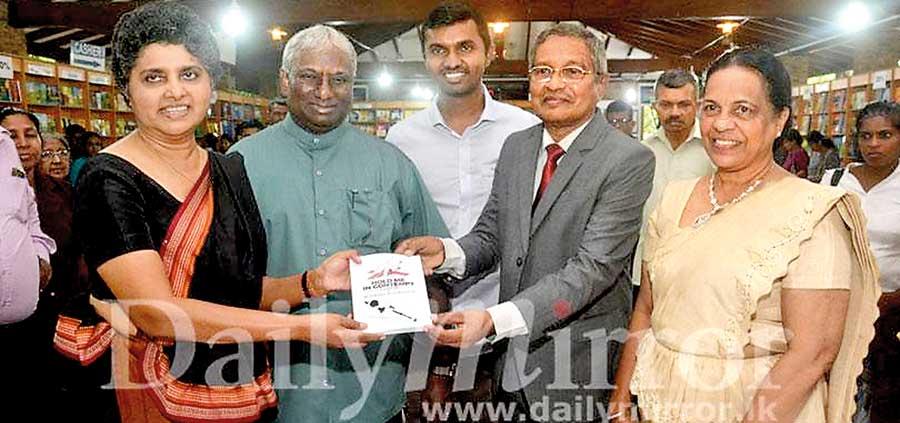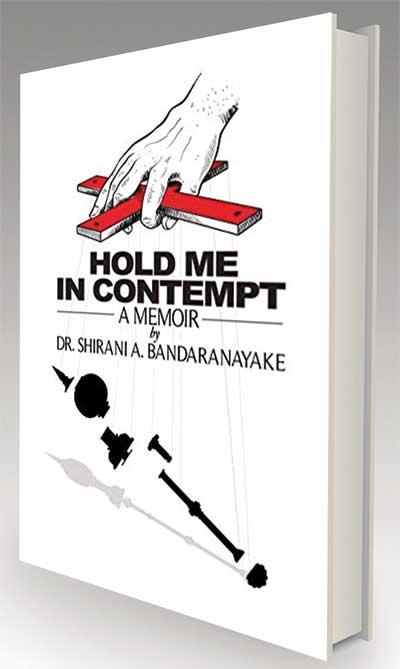Reply To:
Name - Reply Comment

Review of Shirani B’s ‘Hold Me in Contempt’
May 2011 marked the beginning of a historic period for Sri Lanka’s judiciary. As a fundamental arm of government, the judiciary must remain independent to the legislature and executive. But this wasn’t the case when the 43rd Chief Justice (CJ), the first lady and the youngest to hold the position, Dr. Shirani A. Bandaranayake, took office that year. While battling political  agendas that undermined her duties, she also faced an illegal, state-sponsored impeachment process. Nine years later, Dr. Bandaranayake breaks her silence in her memoir ‘Hold Me in Contempt’ or ‘Uththareethara Doshabiyogaye Athulanthaya’ in Sinhala.
agendas that undermined her duties, she also faced an illegal, state-sponsored impeachment process. Nine years later, Dr. Bandaranayake breaks her silence in her memoir ‘Hold Me in Contempt’ or ‘Uththareethara Doshabiyogaye Athulanthaya’ in Sinhala.
The book is replete with insights into the events leading to the impeachment and its aftermath. Having long years of service in the judiciary, Dr. Bandaranayake was seen as deserving of the CJ title. But she writes that from the day she took oaths as CJ, she faced numerous issues. She pens the thoughts that crossed her mind before leaving home to take oaths: “I loved my work that threw challenges at me. The hardships were to wade through marshy waters, full of unseen crocodiles. I looked at myself in the tall mirror of our dressing table. Out of the blue, I remembered my ringing of the Bell at the summit of the Adam’s Peak which I had climbed as  a child. The chime was continuing in my minds eye, even when I was descending the stairs to leave home.”
a child. The chime was continuing in my minds eye, even when I was descending the stairs to leave home.”
The book sheds light on how she planned to clear the backlog of cases mainly in Magistrate and District courts during her five-year term. She also planned to digitize court registries and introduce e-filing of cases to improve the judiciary.
At one point she writes: “When what’s right is revealed from what’s wrong and the rectification is accomplished through judicial process, on occasion, persons behind those processes receive bouquets and garlands of accolade. It is generally delightful to receive those; but not when they are made out, not of flowers but of wrath and resentment. It was the latter which came my way to say the least in abundance.”
When Dr. Bandaranayake took office in 2011, she had to give a determination on two crucial and controversial Bills: an amendment to  the Town and Country Planning Bill and the Divi Neguma Bill. She ruled the Bills could not become law as they did not comply with Article 154 of the Constitution. This section, under the 13th Amendment, refers to Bills listed under the Provincial Councils (PCs). Accordingly, for Parliament to pass such Bills, it was mandatory that after being gazetted, and before being placed on the Order Paper, the President refer such Bills to all PCs for approval. According to an article written during the time, the enactment of the Sacred Areas Act would have made land-grabbing easy, fast and completely legal. The Divi Neguma Bill, according to Dr. Bandaranayake had not one, but two Bills placed before the Benches she presided over. Similar to the Town and Country Planning Bill, it wasn’t referred to the PCs, and therefore it was ruled against.
the Town and Country Planning Bill and the Divi Neguma Bill. She ruled the Bills could not become law as they did not comply with Article 154 of the Constitution. This section, under the 13th Amendment, refers to Bills listed under the Provincial Councils (PCs). Accordingly, for Parliament to pass such Bills, it was mandatory that after being gazetted, and before being placed on the Order Paper, the President refer such Bills to all PCs for approval. According to an article written during the time, the enactment of the Sacred Areas Act would have made land-grabbing easy, fast and completely legal. The Divi Neguma Bill, according to Dr. Bandaranayake had not one, but two Bills placed before the Benches she presided over. Similar to the Town and Country Planning Bill, it wasn’t referred to the PCs, and therefore it was ruled against.
Dr. Bandaranayake refers to ‘whispering birds’ who started humming, firstly mildly, as she took office.
But with each judgment given, their humming grew more clamorous.
She writes that during her tenure there were several other matters that came before Benches presided by her. These judgments were accepted by the rulers with “indignation and displeasure”. Dr. Bandaranayake explains that all those decisions were in violation of fundamental rights based on executive and administrative actions.
"She ends summarizing a ‘witch hunt’ which had just begun..."
She writes that her never-bow-down attitude was loathed by many. An illegal impeachment was their only hope. Subsequently her family members were targeted. From Chapter three onwards she takes the reader on a chilling journey through the series of events  that led to a significant section of the nation standing against one woman. From filing 14 charges against her and her family, to the unpleasant encounters at the Parliamentary Select Committee (PSC) that unethically exercised judicial powers to terminate her, the book includes detailed incidents on how the rulers tampered with the independence of a fundamental arm of government.
that led to a significant section of the nation standing against one woman. From filing 14 charges against her and her family, to the unpleasant encounters at the Parliamentary Select Committee (PSC) that unethically exercised judicial powers to terminate her, the book includes detailed incidents on how the rulers tampered with the independence of a fundamental arm of government.
The book also includes letters exchanged between the Presidential Secretariat and the CJ, the discussions that took place during the inquiry and how her family felt unsafe as they were constantly been followed by government-sponsored goons. She also writes how the ruling party members at the PSC catcalled her using words such as pissu gaani (mad woman), meyata adamla godak innawa (she has a lot of male supporters) and baba wage hitiyata baba wage wada na (although like a small child her work is not childish). Only a woman knows how unpleasant it is when a group of men engages in such despicable behaviour.
In the latter part of the book she explains the aftermath of the impeachment, the struggle to leave her official residence and settle down at her private residence to not being able to visit the Supreme Court complex to bid adieu to her staff and collect her belongings. Her impeachment was condemned by lawyers internationally. They also called for justice for her.
She ends the book by summarizing the entire episode as a ‘witch hunt’ which had just begun.
The book is a publication by Sarasavi Bookshop and is available in all outlets.